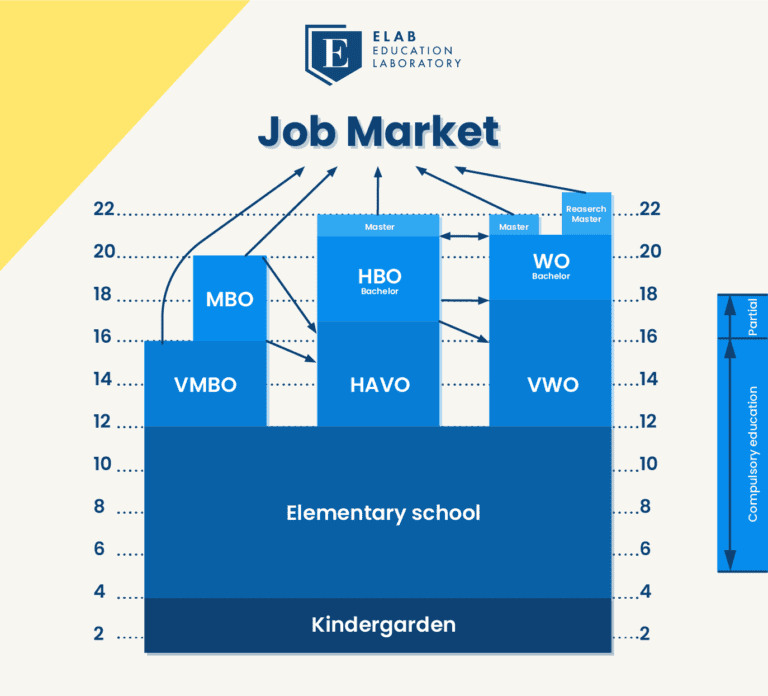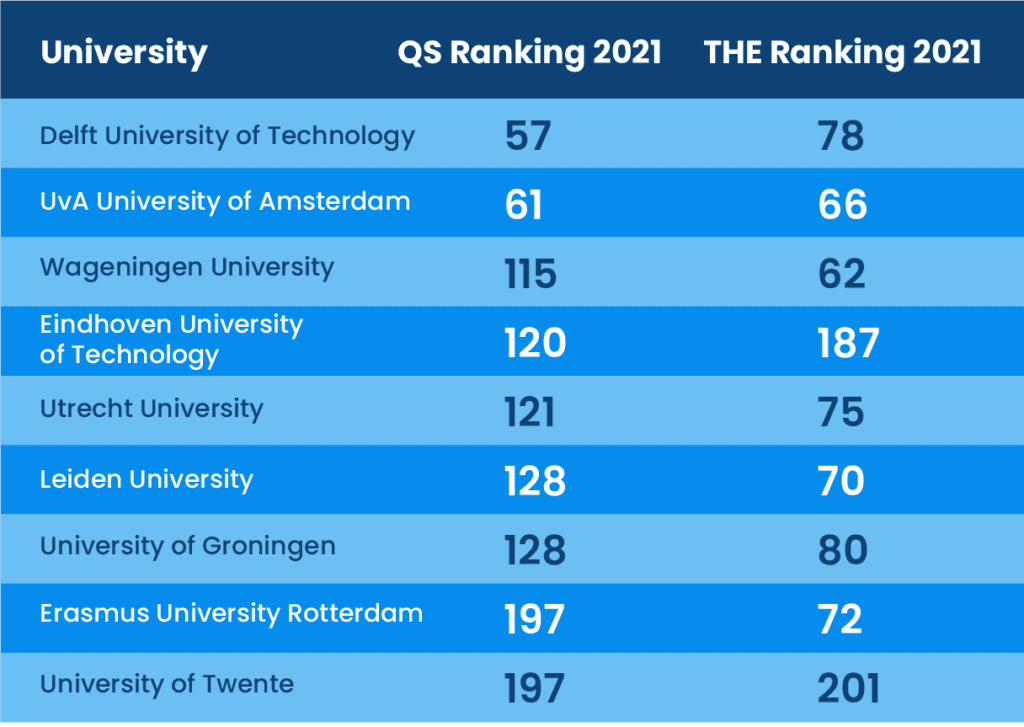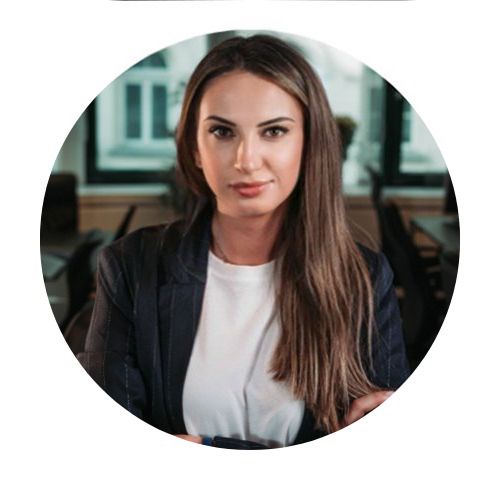The education system in the Netherlands
The education system in the Netherlands
The education system in the Netherlands begins with kindergarten and, by the age of four or five, children have moved to Stage 1 -elementary school- where they will spend the next seven to eight years. Full-time education is compulsory from 5-16, and from 16-18 young people must attend some form of school for at least two days a week.
The education system in the Netherlands is overseen by the Inspectorate of Education which has the power to shut schools or to oblige them to modify their management or curriculum. There are, broadly speaking, three main types of schools:
- Public schools
- Special schools -which are religious rather than focussing on special needs
- General schools – which are not religious, or simply neutral
In addition, there are Islamic schools and a small number of private schools, which include around 150 international schools. There is no automatic moving up a grade at the end of each educational year. Retakes are common, in spite of the fact schools offer additional support and extra teaching to those children who are finding it hard to keep up with their peers.


Education in the Netherlands
Elementary school consists of eight grades, or groups, and at the age of 12 children sit the Cito test, or the School Final Test, to determine where their abilities lie and what kind of secondary school is most suitable for them. Parents and teachers are permitted to have a say in this decision, although parents do not always take advantage of this opportunity. Many educators believe that 12 is far too early to determine a child’s IQ and skills, and the system makes allowances for this, by ensuring there is an uncomplicated process for moving from one secondary school to another. Unfortunately, this does not take into account the fact that a child whose education has focussed on vocational training will inevitably lag behind their classmates when they change schools. Some estimates state that 40 per cent of children are placed in the wrong type of school. Equally, while children may be slow developers and need to go up the system, other children can be moved down if they cannot cope with the type of education they were assigned at the age of 12.


Education system in the Netherlands
Courses are taught In small classes and there is a strong emphasis on team and project work, as well as innovation and creativity.
The education system in the Netherlands – Secondary Schools
There are three types of secondary schools in the Netherlands.
VMBO schools provide pre-vocational education. Sixty per cent of Dutch children will attend a VMBO for four years. These schools teach the arts and sciences, languages, history, and maths, and provide a mixture of vocational and academic training . They have four streams, where the balance between the two types of learning differs:
VMBO-TL – mainly theoretical teaching and learning (academic).The theoretical learning path.
VMBO- GL – this falls halfway between the TL and KBL approach, see below. The mixed learning path.
VMBO-KTL – equal emphasis on theory and vocational practice. The middle-management oriented learning path.
VMBO-BBL – mainly vocational training. The basic, profession-oriented learning path.
HAVO schools are attended for five years and are the gateway to applying to Universities of Applied Sciences. These senior general education schools have five grades and students can apply to transfer to a VWO, which offers pre-university education. The schools follow a core curriculum in the three lower years, and then students can choose between four directions: science and technology; science and health; economics and society; and culture and society. HAVO students also take two subjects linked to the combination they have chosen and sit seven examinations in order to gain their school leaving diploma.
Both HAVO and VWO students have to take a number of compulsory subjects:
- Dutch
- English
- PElting.
- Culture and the Arts
- Social studies.
VWO schools. Students attend their VWO school for six years and the VWO diploma is accepted for entrance to a research university. Certain schools, particularly those close to the border with Germany, teach up to half of their classes in German, while others teach a number of classes in English. Since VWO school programmes last for a year longer than those of HAVO schools, there is a greater emphasis on in-depth knowledge and preparation for studying at university level. After finishing the core curriculum, students choose one of the four subject clusters or profiles (see above) which are taught at a higher level than in HAVO schools.
The VWO is divided into two styles of programme: atheneum and gymnasium. Atheneum programmes include compulsory Latin and Greek . Certain schools also offer the VWO-plus, which teaches philosophy, research methodology and additional foreign languages. This is not an official school level and cannot be found throughout the Netherlands.


Understanding the Dutch Education System
Dutch universities are world-renowned for high quality teaching and research. Many degrees are taught in English and more than 100,000 international students choose to study in Holland every year.
Education in the Netherlands – Higher Education
MBO- Middle-level applied education.
This is the natural route of progression for students who have attended a VMBO and prepares students for a range of skilled trades or to play supporting role in a number of professions, such as nursing, engineering, architecture, criminology, or medicine. The MBO lasts for 1-4 years and runs at four levels:
Level 1 -assistant training, 1 year duration.
Level 2- executive training.2-3 years.
Level 3 – independent working, 3-4 years.
Level 4 -middle management -3-4 years. Students who have finished Level 4 can go on to enrol in an HBO or start working.
There are two types of MBO: apprenticeship training, where over 60 per cent of the course is practical and carried out in a working environment; or school-based education, where training takes up between 30-59 per cent of the curriculum.
HBO-Higher professional education
HBOs are also known as Universities of Applied Sciences.
HBOs are general institutions which specialise in specific fields, from agriculture to performing arts, game design and architecture to life sciences. Courses are taught In small classes and there is a strong emphasis on team and project work, as well as innovation and creativity. Unlike research universities, HBOs prepare their graduates for specific roles within the job market and have strong links with industry . HBOs constantly monitor the job market to ensure their graduates are meeting its needs and learning the skills which are most in demand. The focus is on problem-based learning , and work placements, both at home and studying abroad, are commonly offered as part of your course. Students usually go abroad after the end of the second year. These are not research institutes, unlike their WO counterparts, and teaching is hands-on rather than purely theoretical.
There are more than 40 Universities of Applied Sciences in the Netherlands and graduates are awarded degrees which cite their field of study. For example, if you get a bachelor’s studying nursing , you will have a Bachelor in Nursing, and not a BA or BSc.Courses usually last for four years. Similarly, if you pass your Master’s, which takes between 1-2 years, you will get a Masters in a specific field, e.g.: Master in Social Work, rather than an MA or a MSc. It is not possible to do a doctorate at an HBO.
Applications to universities of applied sciences must be uploaded between March and July. Admissions boards are far more interested in the number of hours you have spent studying a subject than simply a list of actual and predicted grades and will ask you to give a description of the subjects you have taken, and how long you spent on courses related to the field to which you are applying.
Among the most popular universities of Applied Sciences are:
- Hanz, Groningen
- Amsterdam University of Professional Education
- HU, Utrecht
- Avans , Breda/Tilburg/Hertogenbosch (named best University of Applied Sciences in 2021)
- Leden
- Has
- Breda, Venlo/Hertogenbosch
Universities of Applied Sciences are not included in most rankings published abroad, and those which do exist are in Dutch.
WO-Research Universities
You can get your undergraduate degree in three years at a research university, whereas a Master’s takes between 1-2 years. The Netherlands’ research universities are very similar to traditional institutions of learning, found all across the world, with an emphasis on research and independent study. The table, below, provides an overview of recent rankings – but remember that the ranking of your course is just as important as that of the institution. Elab can provide you with detailed analysis of the best universities to apply to in the Netherlands, once you have chosen which degree you wish to study. The choice is wide, since at present there are over 370 undergraduate courses taught in English in the Netherlands, and 1500 at Master’s level.


The education system in the Netherlands: Applying to university
The application process is centralised through the Dutch admissions system, Studielink.You will need to provide some, or all, of the following documents:
- Academic transcripts
- Passport or ID
- Up to four photographs
- Proof of English language proficiency (IETS 6+, CAE grade C etc)
- An essay or a personal statement
- References
- Proof of finances – if necessary.
Each applicant is allowed to apply to four courses a year, but only two of these can be “numerus fixus” – limited number courses. If you do wish to be considered for a numerus fixus course, your application has to be submitted by 15 January. You will be given a number and place in a queue , based on the information you have provided, and will go up the list if other applicants drop out or reject the place.
I May is the general deadline, although certain universities are more flexible and accept applications uploaded after this date.
The education system in the Netherlands -Tuition fees and living costs
EU citizens pay the statutory tuition fees, which were approximately 2168 euros in 2021-2022, and are expected to be 2209 in 2022-2023. At present the Dutch central government is offering all first-year undergraduate students a 50 per cent discount on their tuition fees, as a result of the pandemic. Non-EU students pay the institutional fee, which is far higher.


How expensive is it to live in the Netherlands?
An average room in Holland costs somewhere between € 300 and € 600 a month. The costs depend on the city where you study, what is included in the rent and the arrangements made by the institution.
A recent poll of students in the Netherlands broke down their monthly expenses (in euros) as:
- Food 180 euro
- Accommodation 350-800 euro
- Tuition 200 euro
- Insurance 80 euro
- Clothing and entertainment 100 euro
- Books 50 euro
It has been estimated that studying in the Netherlands costs in the region of 1000 euros a month, inclusive of tuition fees – a very reasonable sum. And, of course, you are entitled to apply for a range of financial grants and loans.
Financial help to study in the Netherlands
All EU citizens are entitled to apply for the Collegegeldkrediet, a loan to cover tuition fees, as long as:
- You are under 30 years old
- You have a Dutch bank account
- You have a BNS, a national social security number which you will get once you register your permanent address in the Netherlands. The BNS is essential for all types of administrative tasks, from getting a mobile phone contract to finding work. The process is straightforward
You cannot apply for the loan until you have received a confirmed offer of a place at a Dutch university, and up to 31 January in that academic year.
You can also apply for the Studiefinanciering grant if:
- You work in a registered job. Do not assume this will be easy, since Dutch employers prefer their staff to speak Dutch, so if you have the time and motivation, it would be extremely useful to pick up at least a smattering of Dutch before you leave for the Netherlands. Put your summer break to good use!
- You register for income tax and national insurance – even though you will not pay these, as a student, unless your earnings are very high.
- You work at least 56 hours a month, 12 months a year. This stipulation is often overlooked by students, who assume that they will still be able to have a Christmas break back at home and a six-week summer holiday. This is not the case, if you want to keep on being eligible for the grant.
- You can apply for the grant three months after you have started working, no earlier, since you will have to produce three months’ worth of payslips to submit the application for financial aid.
Application process
Elab will take you through the process of applying for the loan and the grant ,and explain repayment schedules, how much you are likely to be given per month , etc. Call or email Elab for further information or estimates of how much financial help you are likely to be offered .

